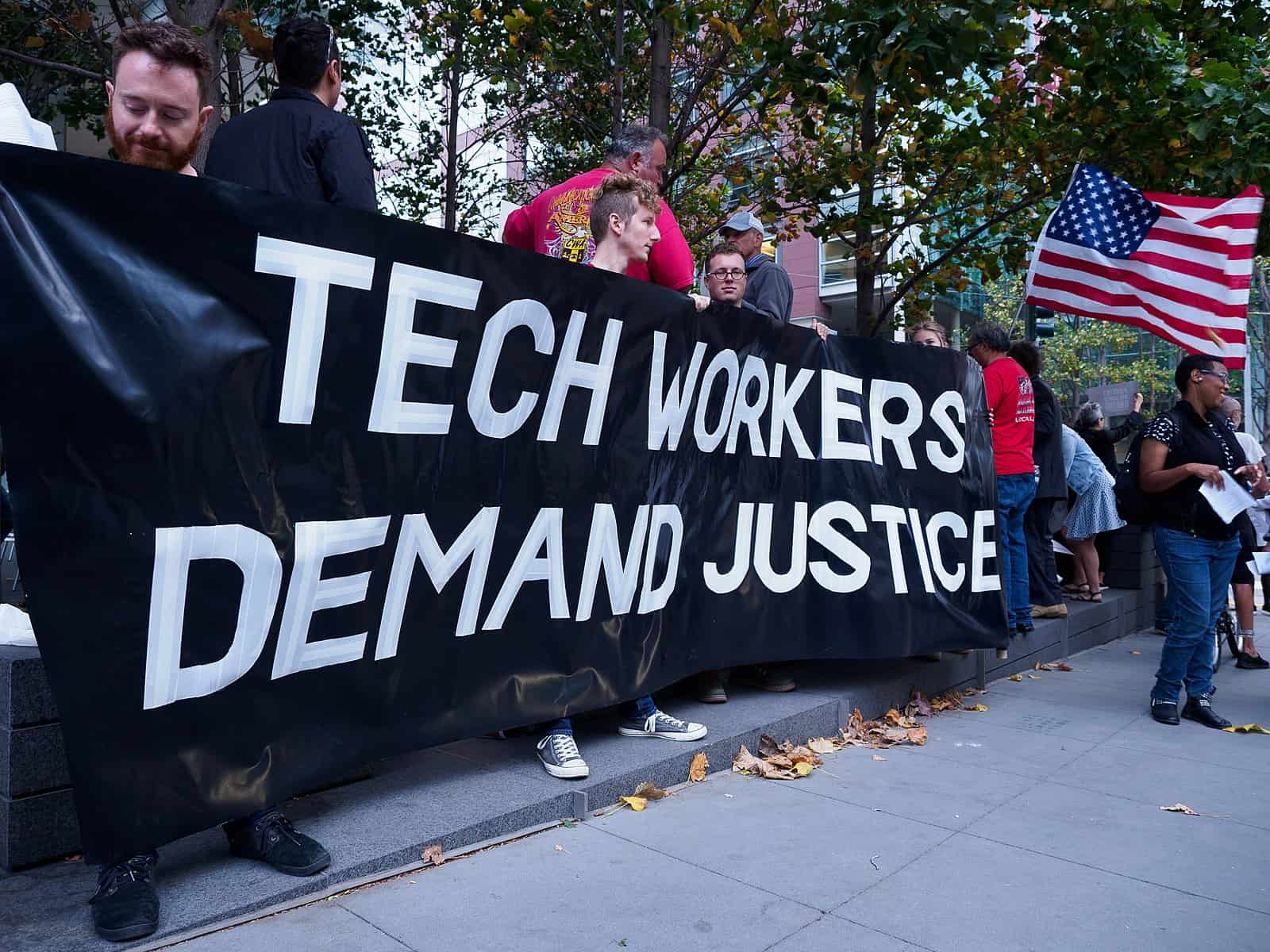
Jacki Silbermann is a student at Harvard Law School and a member of the Labor and Employment Lab.
This is the first post in a series of three. Check back tomorrow and Friday for part two and part three.
It’s a fraught time for tech workers. The tech sector, which for decades has largely remained outside the realm of organized labor, has emerged over the past few years as a locus for collective action. But even more interesting perhaps, much of the recent tech activism challenges conventional notions about worker interests in the workplace. Beyond unions’ traditional bread-and-butter demands, like better wages and benefits or workplace health and safety protections, tech workers insist on something different from their employers – a change in business practices that negate social responsibility and run counter to their moral convictions. The recent collective action in the tech industry invites serious discussion about the underlying aims and subjects of worker collective action – both concerted activity and collective bargaining – and how existing policy should change in order to reflect those aims.
Using tech organizing as a case study, this three-post series examines plausible normative arguments in support of the view that the moral integrity of employer business practices should constitute part of the terms and conditions of employment. This first, introductory post will provide a brief overview of some of the issues at the center of recent and ongoing collective action in the tech sector, as well as how present U.S. labor law fails to protect such organizing or to impel an employer to bargain over such subjects, should tech workers choose to pursue such a strategy. The second and third posts will delve into some of the possible normative justifications for viewing moral issues regarding employer business practices as a part of the terms and conditions of employment.
Organizing in High Tech
In early 2018, nine Google cloud engineers (aptly nicknamed the “Group of Nine”) refused to work on “air gap” technology, a security feature necessary for work with sensitive information which would help Google win lucrative U.S. military contracts. This eventually led to larger employee protests against similar Google business deals, including a contract to sell A.I. tech to the Department of Defense for analyzing drone footage, nicknamed “Project Maven.” In June 2018 Google announced to its employees that following employee protest against Project Maven and other projects that would put Google in “the business of war,” the company would not renew its government contract. Later that year, 20,000 Google workers around the globe staged a synchronized walkout protesting a variety of workplace issues, among them the ethical implications of how and by whom Google technologies are deployed. And more recently, Google pledged not to build A.I. tools to enhance oil and gas extraction following intense criticism from its workers over the company’s contribution to climate change.
Amazon, Microsoft, Accenture and Palantir employees have demanded that their companies cease providing software and other technological infrastructure that enable Immigration and Customs Enforcement (ICE) policies that lead to separation of children from their parents. Microsoft employees have carried out a public campaign against their employer’s work with the Department of Defense and Amazon employees have demanded that their employer cease providing facial recognition technology to U.S. law enforcement. Most recently, amidst protests following the killing of George Floyd, Amazon placed a one-year moratorium on sales of such technology to police, while IBM and Microsoft announced that they will not sell facial recognition technology to police departments until federal regulations for its use are put in place. And Facebook employees joined protests against employer complicity in racial discrimination by staging a virtual walkout against the company’s refusal to take down or place a warning on President Trump’s posts on the protests, putting up automated away messages in their email accounts and digital profiles.
The sheer dynamism of the tech worker movement over the past two years is astounding, and the list of employee letters, petitions, walkouts and other actions continues to grow. Tech workers have garnered a great deal of public support for these and other campaigns and the companies themselves have at times yielded to employee demands to cancel contracts to supply services that workers oppose. But as concerted activity among tech employees grows, so too does the threat of employer retaliation. In November 2019, four Google engineers were fired for speaking out against the company’s “unethical business decisions” (Google alleges that the employees violated company data security policies). Companies like Amazon and Google have also claimed that such speech goes against workplace policies regarding internal and public speech, warning employees of possible repercussions. Just recently, Amazon fired two employees for “repeatedly violating internal policies.”
Legal Limits to Organizing for Moral Objectives
It is doubtful that the National Labor Relations Act (NLRA) would provide protection for concerted activity in favor of tech workers’ aims, as they do not speak to workers’ material interests stemming from their employment. For the same reason, employers would likely have no duty to bargain over such subjects should employees demand as much.
The NLRA establishes workers’ “full freedom of association, self-organization, and designation of representatives of their own choosing, for the purpose of negotiating the terms and conditions of their employment or other mutual aid or protection.” The language is quite broad, offering unions and management a great deal of latitude on the subjects of labor relations. Yet, judicial opinion gradually shaped a labor relations system that facilitated and protected the sides’ economic interests only, including protection of managerial property rights to the business and its direction.
In a series of well-known decisions that have been discussed at length in the academic literature (Borg-Warner, Fibreboard and First National Maintenance), the Supreme Court determined that employers have no obligation to bargain with employees over business decisions which have no bearing on the material conditions of employment and lie squarely within managerial prerogative. Thus, the Court effectively erected a fence around subjects that workers consider crucial to their interests, virtually shielding those subjects from the collective bargaining process and any worker influence. It is now well established that mandatory subjects of bargaining are limited to employee self-interest regarding material conditions of the job, such as wages and benefits, job security and health and safety conditions in the workplace. Likewise, the Supreme Court and the NLRB have narrowed Section 7’s protective shield over concerted activity, holding that such protections apply only to “employees’ interests as employees,” clearly excluding employee action meant to further employer social responsibility and the effects of business on the wider public. As such, walkouts, work stoppages and public campaigns of the type described above are almost certainly beyond the issues over which employees can presently conduct protected concerted activity.
As Andrew Strom recently highlighted on this blog, some of the latest strikes in tech and other industries illustrate the disconnect between current U.S. labor law and workers’ conceptions of what constitutes their working conditions. Recent tech organizing has made it abundantly clear that at least some workers view the moral character of employer business practices as an integral part of working conditions, and that the objectives of labor relations extend beyond workers’ material interests. But for this view to become a robust claim and to transform U.S. labor law, it must rest on sturdy, normative footing, to be discussed in the following two posts.









Daily News & Commentary
Start your day with our roundup of the latest labor developments. See all
February 4
Lawsuit challenges Trump Gold Card; insurance coverage of fertility services; moratorium on layoffs for federal workers extended
February 3
In today’s news and commentary, Bloomberg reports on a drop in unionization, Starbucks challenges an NLRB ruling, and a federal judge blocks DHS termination of protections for Haitian migrants. Volatile economic conditions and a shifting political climate drove new union membership sharply lower in 2025, according to a Bloomberg Law report analyzing trends in labor […]
February 2
Amazon announces layoffs; Trump picks BLS commissioner; DOL authorizes supplemental H-2B visas.
February 1
The moratorium blocking the Trump Administration from implementing Reductions in Force (RIFs) against federal workers expires, and workers throughout the country protest to defund ICE.
January 30
Multiple unions endorse a national general strike, and tech companies spend millions on ad campaigns for data centers.
January 29
Texas pauses H-1B hiring; NLRB General Counsel announces new procedures and priorities; Fourth Circuit rejects a teacher's challenge to pronoun policies.